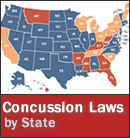Both Montana and West Virginia have enacted youth-concussion laws within the past month, becoming the 47th and 48th states to do so, respectively.
The Montana law, signed by Gov. Steve Bullock on April 22, contains all three major provisions of the National Football League’s model legislation, Washington state’s Lystedt Law. It requires parents and prospective student-athletes to sign a concussion-information form before the student-athlete can participate in sports; any student-athlete suspected of a concussion while playing sports to be immediately removed from practice or a competition; and any student-athlete who sustains a concussion to obtain medical clearance from a health-care provider before returning.
Additionally, the Montana law requires each coach, athletic trainer, and official to complete a concussion-training program at least once each school year. It went into effect immediately on being signed.
The West Virginia law, signed by Gov. Earl Ray Tomblin on May 1, largely mirrors Montana’s. It contains all three of the key provisions of youth-concussion legislation and requires all head sports coaches in middle and high schools to complete an annual concussion-training course.

Also, all member schools of the West Virginia Secondary School Activities Commission must submit a report to the commission within 30 days of a student-athlete sustaining a concussion or being suspected of suffering a concussion. The report “must state whether an evaluation by a licensed health-care professional verified that a concussion or head injury was actually suffered, whether the athlete received written clearance to return to play or practice, and, if written clearance was given, the number of days between the incident and the actual return to play or practice.” The commission will then submit those reports to “appropriate state and national organizations or agencies.”
The law goes into effect 90 days after being passed, so student-athletes will be affected by it starting in the 2013-14 school year.
With the actions taken by Montana and West Virginia, only two states now lack any form of enacted youth-concussion law: South Carolina and Mississippi. South Carolina’s youth-concussion legislation, after being passed by the state House on March 21, was sent to the state Senate committee on education. It spent nearly two months there before the committee offered a favorable report (with an amendment) on May 13.
Mississippi alone is not considering any form of youth-concussion legislation. A handful of youth-concussion bills were introduced during the 2013 legislative session, but none made it past committees.